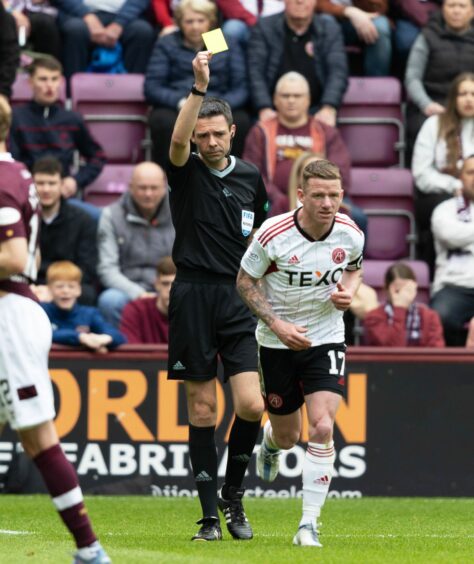Aberdeen lost their £5 million battle with Hearts at Tynecastle – but are still favourites to win the war. How did our expert rate the referee and other officials’ performances in the Jambos’ 2-1 victory?
The win moved the home side within two points of the third-placed Dons with two Premiership games left to play, with both teams desperate to lay claim to a best-of-the-rest position which all-but-guarantees the riches of European group stage football next season.
Mattie Pollock’s header looked to have given the Reds a one-goal half-time advantage, but Josh Ginnelly’s wonder-strike levelled the scores before the interval, with Hearts’ grip on the game tightening in a second period where ex-Aberdeen youth academy forward Lawrence Shankland slotted the winner.
The man in the middle for the clash in Edinburgh was Kevin Clancy, and, below, our refereeing columnist Finlay Elder assesses his showing, as well as the influence of VAR on proceedings.
Let ref and VAR review big calls at same time
We start off with a big shout for a penalty after a clumsy coming together between Marley Watkins and Peter Haring in the Hearts box in the 26th minute.
After a collision between Bojan Miovski and Kye Rowles on the edge of the area, the referee was not interested in awarding a foul.
The ball then found its way to Watkins, who appeared to be tripped by the Jambos player.
My initial reaction was penalty, though I was sitting at the other end of the ground.
Ref Clancy was unmoved, however.
A VAR check was to follow, but VAR chose not to send the official to the monitor to review his decision.
Having since seen the replay of the challenge, it would have been a soft foul. I have seen those kinds of challenges being given as penalties, though.
In instances such as these, like I said last week, I would like the VAR protocols to allow referees to be able to immediately head to the monitor themselves just to double-check their decision with their own eyes – instead of waiting two minutes for VAR to make a call on whether to send them over.
If we allowed referees to discuss the call with VAR as they’re looking at it, like with the TMO in rugby, I think a final (more considered) decision could be made, more quickly, on what the ruling is.
Refs can’t penalise players in ball hits arm when it is supporting body
Hearts then had their own penalty shout for handball against Dons defender Angus MacDonald.
The ball did appear to slightly touch the arm of MacDonald.
However, it was a supporting arm, meaning a penalty could not be awarded.
His arm was in a natural position, supporting his body, so no penalty was the right call.
Miovski went down far too easily looking for pen – he should’ve shot
Former Aberdeen player Shankland would go on to score the winner for Hearts.
The Reds’ players were calling for offside, but a VAR check would show Shankland was just in line, which was a good call by the assistant referee.
There was also second half-hearted penalty shout from Aberdeen as Bojan Miovski raced towards the goal.
The North Macedonian looked as if he might get a shot away before going down under the challenge of Toby Sibbick.
I don’t think it was a foul and the referee was right to not award a penalty. I think it was incredibly soft contact for Miovski to go down under.
Clancy’s bookings were head-scratchers, and could have seen Dons’ Watkins sent off
Ref Clancy was incredibly inconsistent with some of his decisions, though. especially his yellow cards. Hearts certainly should have had more than one booking in the game.
The whistler let a lot go at times, but then was suddenly handing yellow cards out for fun.
I think the Dons’ Watkins was potentially lucky to not have been sent off for a second yellow card. However, saying that, I do think his first yellow card was harsh.
He was booked for a reaction to being fouled, which resulted in both players being cautioned – an incident which should have been handled far better by the referee.
Watkins would later block the run of a Hearts player as Aberdeen hit their opponents on the counter.
It was a clear foul in my opinion and could have easily been a second booking.
But, given the nonsense of his initial yellow, justice was done.
- Finlay Elder was a registered referee for six years and a category 5 official, with experience in the Highland League, Juniors and Club Academy.



Conversation